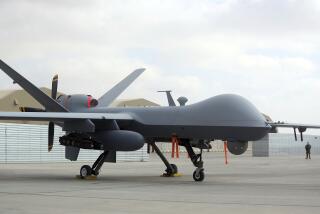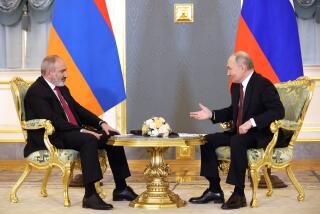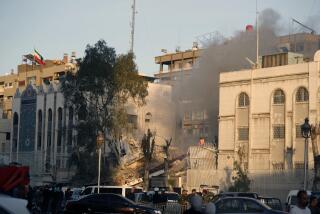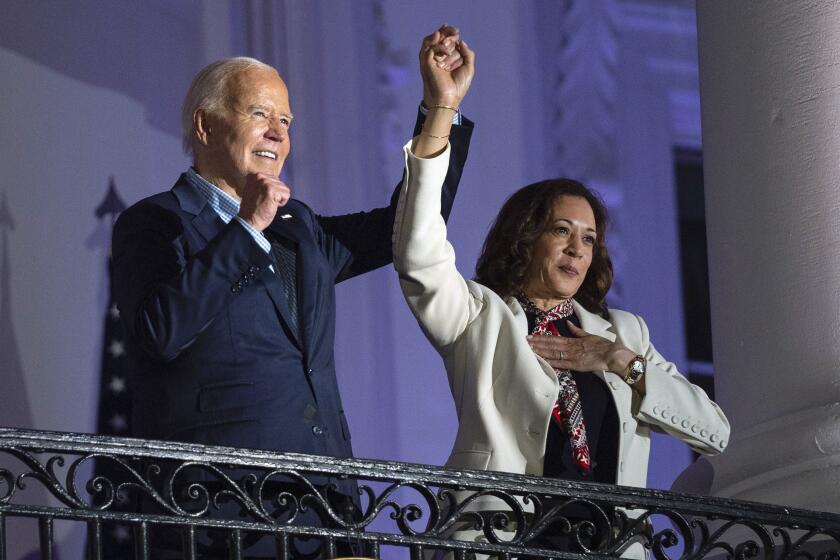Kremlin: It’s no secret that Russia sends arms and advisors to Syria
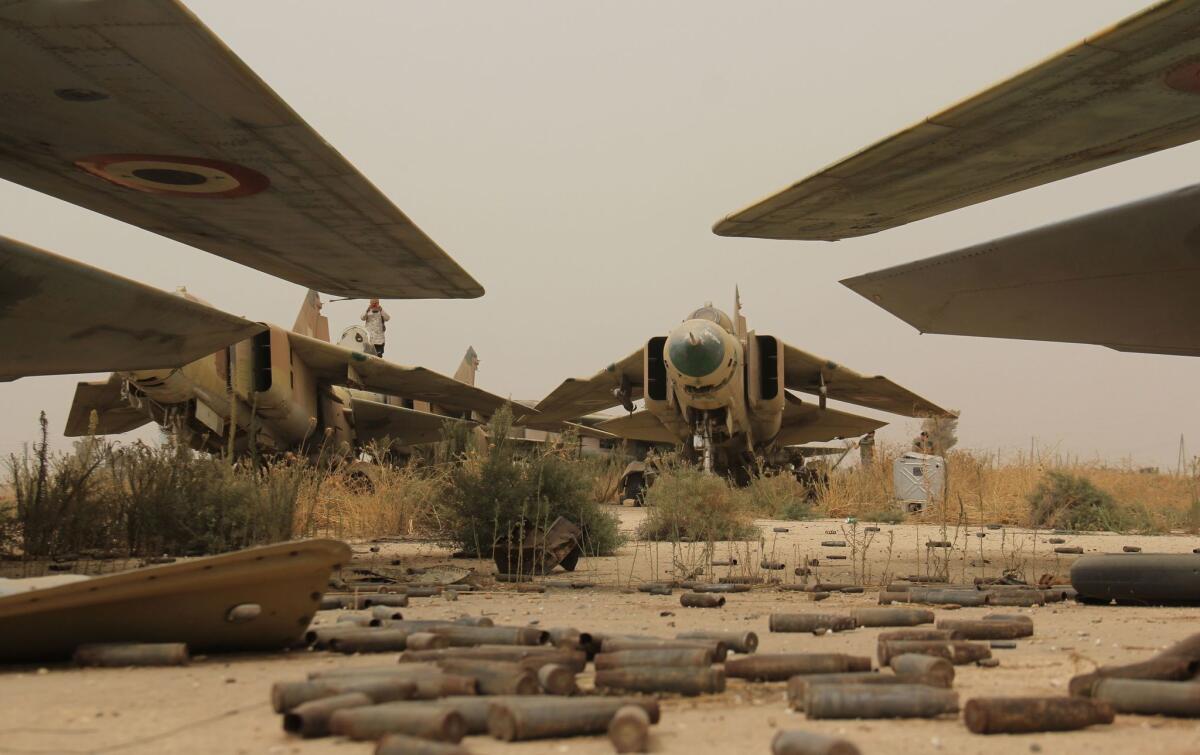
The scene at Syria’s Abu Duhur military airport in Idlib province after it was captured Sept. 9 by an Al Qaeda affiliate, the latest setback for Syrian President Bashar Assad’s forces.
Iran opened its airspace to Russian military planes flying into Syria after the denial of overflight permission by NATO countries in the region, a Russian diplomat in Tehran told the Tass news agency Wednesday.
The move by Iran allows Russia to continue flying humanitarian aid to Syria, one senior Foreign Ministry official said, and another noted that Russia “has never made a secret” of its arms sales and military collaboration with the government of Syrian President Bashar Assad.
The airspace dispute and Moscow’s claim of unabashed alliance with the embattled Assad were the latest developments after the Obama administration’s accusations last week that Russia appeared to be expanding its military presence in Syria and may be preparing to send troops to back Assad.
U.S. intelligence sources last week told the Los Angeles Times and other media that recent satellite imagery shows a significant buildup of Russian arms and equipment in Syria’s Latakia province, Assad’s ancestral home.
Russia has been a loyal ally of the Syrian president throughout the 4 1/2-year civil war and the seizure of huge areas of Syria by Islamic State extremists.
U.S. Secretary of State John F. Kerry called Russian Foreign Minister Sergei Lavrov on Sunday to warn that any military buildup on Assad’s behalf risks more protracted fighting and bloodshed in the country from which more than 4 million have fled.
The two top diplomats spoke again Wednesday, Tass reported, casting the second conversation as more of a collaborative discussion of how to end the war in Syria and cooperate in the shared aim of driving out the Islamic State militants.
“The conversation focused on the problem of peace settlement of the conflict in Syria and certain aspects of Russian-American bilateral relations,” the Foreign Ministry said in a statement. “A road to it lies through a dialogue between the government in Damascus and the opposition.”
U.S. concern about an expanding Russian presence in Syria reportedly led to Washington asking NATO allies to close their airspace to Russian military planes bound for Syria.
Bulgaria, a NATO member state that was part of the Kremlin-dominated Warsaw Pact during the Cold War, on Tuesday confirmed that it had barred Russian military aircraft from overflying its territory due to concern that the planes could be carrying weapons or troops.
A spokesman for the Greek Foreign Ministry also confirmed that it had been asked by Washington to deny airspace use to Russian planes.
A more direct route from Moscow to the Russian base near Syria’s port of Tartus would fly over the Black Sea and Turkey. But Turkey three years ago intercepted a Russian passenger flight and discovered an air-defense system on board and has subsequently barred Russian military planes from flyovers.
Iran on Wednesday offered to open its airspace as part of an alternative route for flights to Syria, a diplomat at the Russian Embassy in Tehran told Tass. Press attache Maxim Suslov was quoted as saying the Russian aircraft were bringing in “humanitarian cargo” for Syrians.
Russian Foreign Ministry spokeswoman Maria Zakharova called the U.S. claims of a Russian military buildup in Syria “a strange hysteria,” but noted that the Kremlin has a long and open history of military aid to Damascus.
“Russia has never made a secret of its military-technical cooperation with the Syrian Arab Republic,” she said in a statement posted on the ministry website and carried by state-run media. “Our country has long supplied Syria with weapons and hardware under bilateral contracts. There are Russian military experts who help Syrians to master exported hardware. Thus, there is a service center for Russian warships in Tartus.”
Moscow has been on a diplomatic offensive in recent weeks aimed at opening peace talks between the Assad regime and its opponents and at working together with Western countries to contain the common enemy of Islamic State.
“We believe that coordinated actions with the Syrian armed forces should be a major element in consolidating efforts to counter terrorism by a broad coalition that President Vladimir Putin has urged to establish,” Zakharova said.
Putin’s vision of the necessary collaboration would include “moderate opposition” forces in Syria, Kurdish militias and “major international regional players that are aware of the extremely serious threat emanating from ISIS [Islamic State] and other terrorist groups,” she said.
The U.S. and other Western governments have supported the Syrian opposition groups that first rose up against Assad in spring 2011, while Russia has refused to abandon its key ally in the Middle East to join forces against Islamic State militants now in control of at least a quarter of Syria’s territory.
Follow @cjwilliamslat for the latest international news 24/7.
ALSO
Russia says Bulgaria’s refusal of flyovers to Syria is a U.S. plot
‘We have the means to help,’ EU leader tells members on refugee crisis
Australia relents on asylum, will take in 12,000 more from Syria and Iraq
More to Read
Sign up for Essential California
The most important California stories and recommendations in your inbox every morning.
You may occasionally receive promotional content from the Los Angeles Times.
